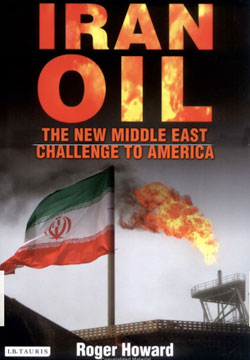به زبان فارسی
PICTORY
LATEST MUSIC
SEARCH
Oily Relations
by bparhami
15-Jun-2010
Iran Oil
The New Middle East Challenge to America
Roger Howard
I. B. Tauris, 2007
REVIEW
This book, by the author of "Iran in Crisis? Nuclear Ambitions and the American Response" (Zed Books, 2004), has a simple thesis: that it is Iran's natural resources, and not its nuclear program, that should inform the reaction of the West to its manipulative foreign policy and ambition for regional domination.
In other words, by pursuing sanctions and other punitive measures, the United States may be misjudging Iran's real weapon (ample natural resources) and undermining its own power. The US trade embargoes on Iran benefit only the US's rivals, who will cheerfully take advantage of the vacuum through investments and trade partnerships.
Iran, for its part, uses rather sophisticated strategies to exploit the rift between the US and other world powers over its natural resources. For example, Iran has cleverly timed tantalizing announcements of new oil/gas field discoveries, with supposedly vast new reserves, to coincide with international worries over its nuclear intentions or snags in multilateral negotiations on monitoring and oversight (p. 4).
China, India, Russia, and other countries, with either a need for Iran's oil and natural gas to fuel their rapidly expanding economies, or with an eye toward the vast Iranian market for foreign imports, are tempted to turn a blind eye on that country's utter disregard for international treaties, so as to keep their favored positions for lucrative economic deals.
Overall, this book provides some interesting insights into the very sensitive relations between Iran and the United States, but there are occasional inaccuracies in describing Iranian institutions and political figures. For example, Akbar Hashemi Rafsanjani and Mahmoud Ahmadinejad are referred to as "premier" or "prime minister" (e.g., p. 37). This mischaracterization may be deliberate, though, given that the function of "President" in Iran is closer to that of prime minister in other countries.
Other observations, such as those having to do with the brutality of the Iranian regime and its total disregard for individual freedoms, are surprisingly accurate and current, given that the book was written long before the recent popular protests and the attendant waves of arrests and imprisonments.
In the last few paragraphs of the concluding chapter, the author advises against the use of labels such as "aggression," "terrorism," and the like. Instead, he favors the use of language that avoids these highly charged, and ultimately ambiguous and unhelpful, terms in the US's dealings with Iran.
| Recently by bparhami | Comments | Date |
|---|---|---|
| Brief book review: Mosaddegh from his own words | - | Nov 05, 2012 |
| From Iran to Hollwood: Book Review | - | Jul 15, 2012 |
| Book Review: Forugh Farrokhzad, Poet of Modern Iran | - | Mar 31, 2012 |
RECENT COMMENTS
IRANIANS OF THE DAY
| Person | About | Day |
|---|---|---|
| نسرین ستوده: زندانی روز | Dec 04 | |
| Saeed Malekpour: Prisoner of the day | Lawyer says death sentence suspended | Dec 03 |
| Majid Tavakoli: Prisoner of the day | Iterview with mother | Dec 02 |
| احسان نراقی: جامعه شناس و نویسنده ۱۳۰۵-۱۳۹۱ | Dec 02 | |
| Nasrin Sotoudeh: Prisoner of the day | 46 days on hunger strike | Dec 01 |
| Nasrin Sotoudeh: Graffiti | In Barcelona | Nov 30 |
| گوهر عشقی: مادر ستار بهشتی | Nov 30 | |
| Abdollah Momeni: Prisoner of the day | Activist denied leave and family visits for 1.5 years | Nov 30 |
| محمد کلالی: یکی از حمله کنندگان به سفارت ایران در برلین | Nov 29 | |
| Habibollah Golparipour: Prisoner of the day | Kurdish Activist on Death Row | Nov 28 |




buying it
by spatima on Tue Jun 15, 2010 04:04 PM PDTthanks for recommeding this
i follow books in iran-us relations for a time now, starting with the Persian Puzzle few years back. this one definately looks interesting.
daste shoma dard nakone
In hope of a Free, Independent and Secular Iran